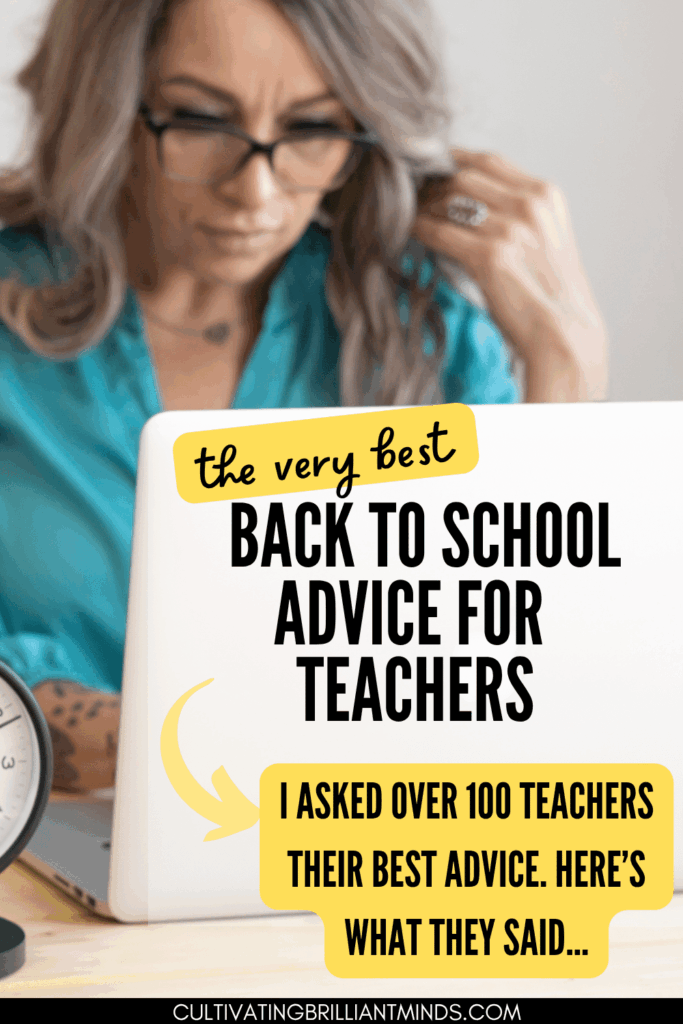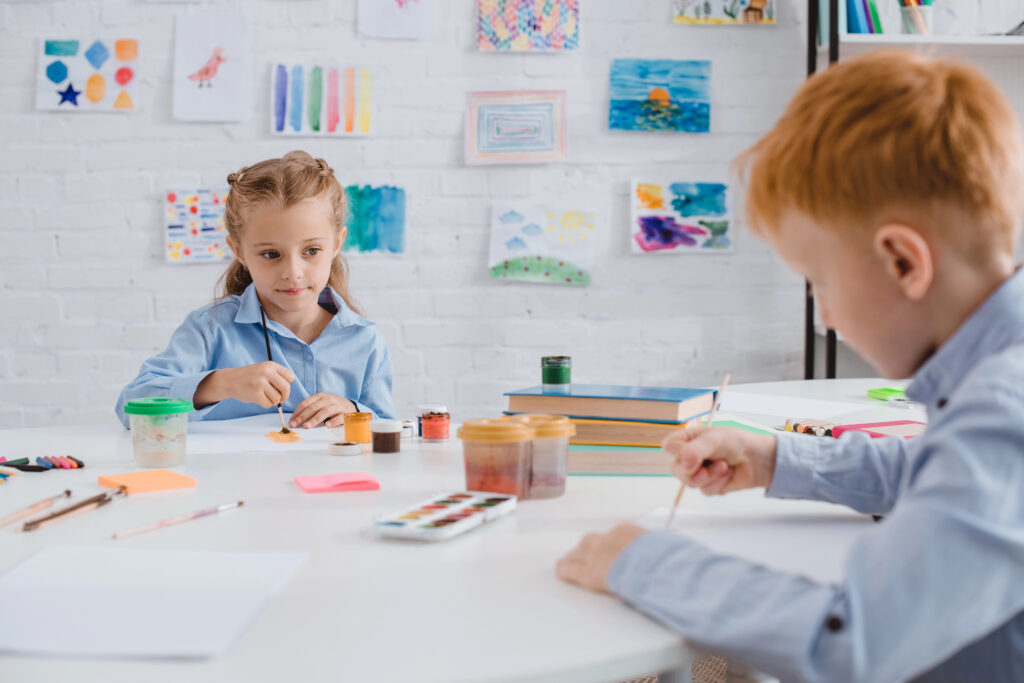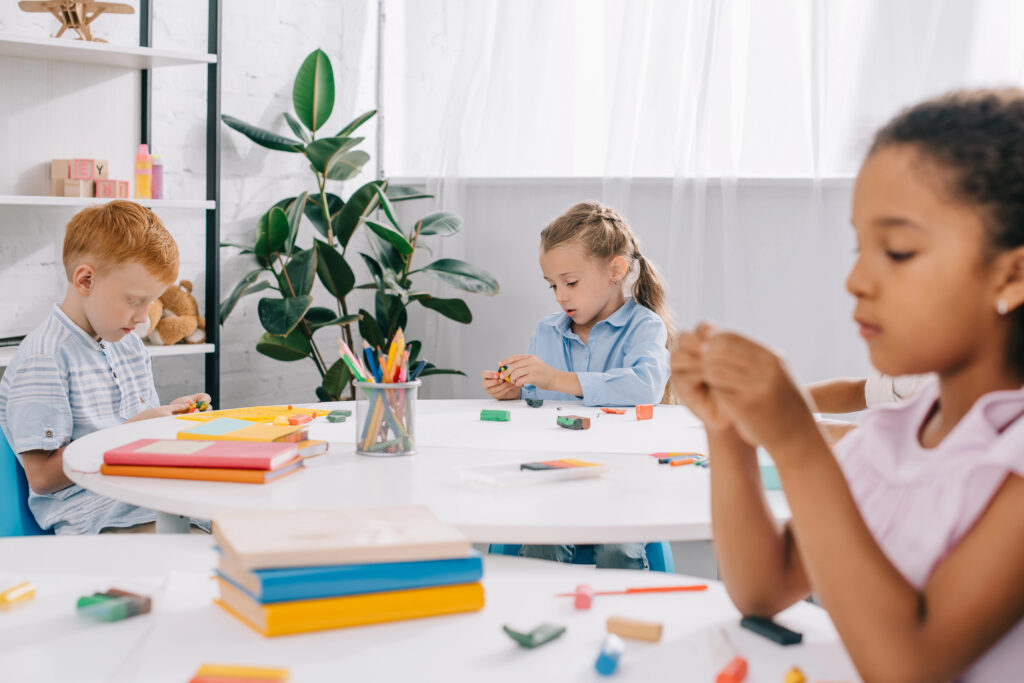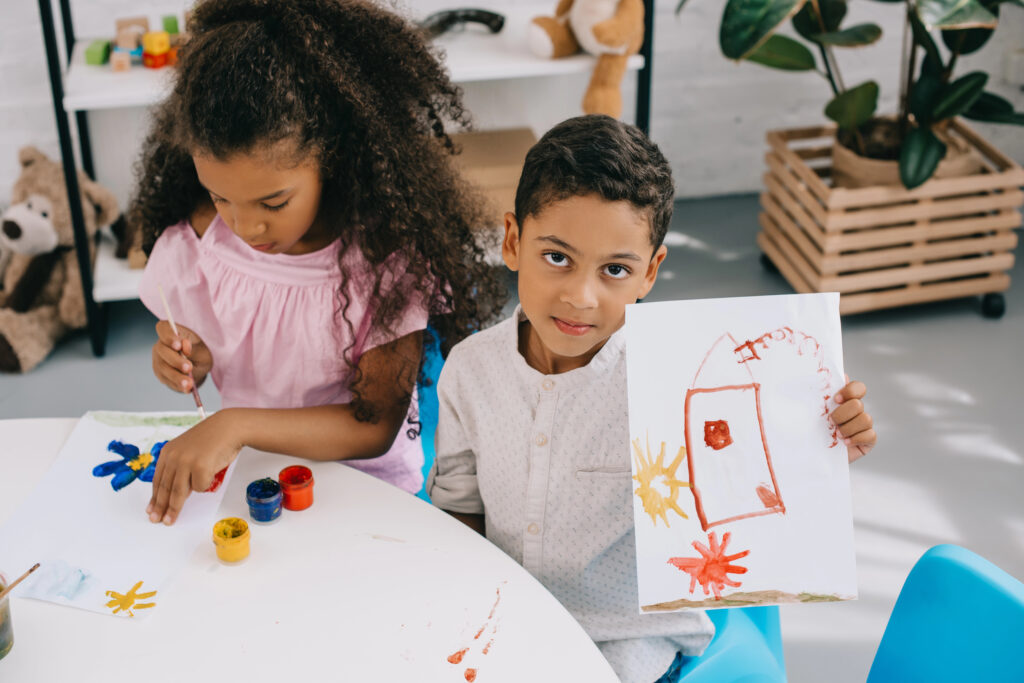Back to School Advice for Teachers

The back to school season is upon us and teachers are all getting their classrooms ready to welcome students in! The beginning of the school year can be chaotic, but what you do during that first week sets the tone for the rest of the year. I recently asked over 100 teachers their best back to school advice for other teachers (they received one drawing into a TPT gift card giveaway I was doing) and there were a lot of similarities in the advice. Here’s what stood out:

TIP #1: Start to Build Relationships with Your Students Right Away
SO many teachers stated that building relationships need to begin on day one. It will help make the year run much smoother and you’ll build trust between yourself and your students. Check out what some of the teachers said:
“I plan for a lot of get to know you games for the 1st week. I believe that creating relationships with students helps students to respect me & makes behavioral issues easier to deal with.” – Tracie
“Focus on building relationships with your students. This is the foundation of your classroom. Classroom management will follow!” -Kendall
“Build relationships with your students. I find out their birthdays before school starts and I buy a set of bulk birthday cards. I go ahead and sort them by month and address / stamp them. When it’s the first day of each month, I pull out the stack and write a birthday note. Then I send out that whole month’s worth of cards. The prep saves so much time and it’s worth it. The kids love getting a card from you!” – Anonymous
“Focus on building relationships but also be careful about activities that ask kids about what they did over the summer. As some may come from sensitive backgrounds or difficult homes, it may be traumatizing for them to recall and share this. Get kids involved in collaboration and ice breakers for the, to feel more comfortable with each other, too.” -Zara
“My tip is to use the first two weeks to build a relationship with your kiddos. Don’t worry about jumping into the curriculum unless you have to do it. Work on teaching your students routines in the classroom. Practice, practice, practice – you’ll thank me later on! -Jamie
“Creating connections with students and staff and just following the routines/procedures will help to set your year up the best way possible.” – Miss Valentine
“Take the time to get to know your students. Relationship building is key. – Dee
“Create strong bonds with your students! If they don’t trust you and they don’t believe you care for them, learning won’t happen!” – @ teachingmeaningfulmemories
“Don’t try to do everything at once. Focus on building relationships and routines the first few weeks and the curriculum will follow more smoothly.” -Laura

“Do a bunch of classroom community activities to build strong positive relationships. Helping them create friendships and bonds means (hopefully) less issues later. – Anonymous
“Build relationships. Ask students what they’d like to be called. I like to have them write letters after [reading] “A Letter From My Teacher on the First Day of School.” Let them know you’ll be their biggest cheerleader.” -Diana
“Focus on building a strong classroom community first. Learning and routines will naturally fall into place & that’s when the magic begins!!” -Anonymous
“GET TO KNOW YOUR STUDENTS! Taking time to build relationships with each student on a personal level… their interests, their family life, etc.!” – Kaylyn
“Focus on social emotional skills and build a classroom community. Relationships are key!” -Shannon
Build Relationships First! Take time to get to know each student personally – greet them by name, learn their interest, and build trust. It’s the foundation of everything.” -Rebecca
Well, there you have it. My number one tip would also be to start building relationships with your students on the very first day (or even during meet the teacher!). These relationships make kids feel safe, loved, and trusted. It will also help you down the road with behavior issues and classroom management. You’ll be thanking yourself around Halloween and Thanksgiving break that you build these relationships with your students!
TIP #2: Set Clear Routines, Procedures, and Expectations. Then, Practice, Practice, Practice!
All teachers know that a smoothly run classroom begins with routines, procedures, and expectations. You can’t fault students for talking in line if you never taught them that they need to be quiet in line and WHY. I ALWAYS share the “why” behind my routines and expectations – it helps students connect to it more and they are more likely to follow them. Instead of saying, “Rule 1: Don’t run with scissors,” instead start up a conversation about WHY you shouldn’t run with scissors. When students understand they can hurt themselves or others if they run with scissors, they are less likely to do it.

Let’s see what other teachers have to say about setting up your routines, procedures, and expecations:
“Routine, routine, routine! The first 2 weeks will dictate the rest of the year!” -Lisy
“Practice routines within routines – and have clear expectations from the first day!” – Mrs. Jackson
“Tackle big routines by breaking them down into micro steps – mini routines! Practice, practice, practice!” – Miss Taylor
“Focus on rules and procedures the 1st week.” – Jenna
“Establish a routine and expectations early in the year! Also prioritize building a positive classroom community!” – Amanda
“Go slow to go fast. Take your time with routines and procedures (budget for more time than you think and have back up activities if they get the hang early). Don’t stress about jumping into content right away because once the routines and procedures are down, everything else will be a lot smoother.” -Megan
“I like to start practicing routines from day 1. Stay consistent and have your students help you come up with class rules.” -Anonymous
“Set clear expectations and routines from the start!” – Brittany
“Go slow to go fast! Practice routines over and over!” -Tabitha
“Practice routines and expectations until they’re fluid!”-Anonymous
“Practice, practice, practice all the routines to set up a successful year!” -Anonymous
“Set clear expectations and classroom routines the first week!” -Sandy
“Spend time repeating procedures. Trust me, it will save you in May.” -Lori
“Set high expectations day one and redo routines until they get them down. It will set the tone for the rest of the year.” -Anonymous
“I love to build a classroom expectation poster together that all the kids sign and hangs at the front of my classroom. I try to keep it to about 5-7 easy to remember ones. It helps build expectations and community!” -Keliah

“Building a great classroom community and setting expectations on day one! I started teaching mid year this year and it’s been hard. So excited to start from the beginning! Also reading these tips to help me!” -Helen
“Introducing routines and the concept of a schedule!!” – Courtney
“Set clear expectations, be consistent, and be a role model.” -Rachel
“We create a social contract on the first day.” -Robin
“Practice routines!! Even as simple as walking in the halls or voice levels. -Anonymous
“Clear expectations and follow through.” -Lea
“Practice, practice, practice routines and make sure you set a routine so the students expect what’s next!” -Linds
“Teaching schedule and routines before anything else.” -Denise
“Start slow and teach, model, reteach expected behaviors and procedures. Go slow to go fast later.” -Heather
“Routines… over and over!” -Cat
“Start getting into a routine right away! It doesn’t have to be fancy, but set clear expectations, so the rest of the year can run more smoothly.” -Sara
As you can see, setting up clear routines, procedures, and expectations in the first weeks of school and following through is so important. Expectations are useless when you don’t follow through. And don’t worry – following through with whatever behavioral consequence you have in your classroom doesn’t make you mean (and it won’t make your students hate you) – it’s there for a reason. Remember in tip 1 when I said it’s important to explain the “why” behind a rule or expectation? That will help you here!
TIP #3: Don’t Work Over the Summer… Unless You Want To!

Summer is your time to unwind and relax, so don’t feel pressured to do any school-related work unless you want to. I started out as the “work all the time” person. I was constantly working waaay after hours, nights, and weekends. Honestly, at first I didn’t mind. I was so excited and wanted the best activities for my students. But it didn’t take me long to burn out. Instead of doing all this extra work, I started leaving at my contracted time, not working on weekends, and taking every. single. one. of my vacation days. You can’t show up for your students if you’re burnt out, so make sure to take care of yourself first! A quick teacher tip about burnout:
“Take care of yourself! It’s never too early to start. Teaching can be demanding, so don’t forget to schedule time for yourself to recharge. Burnout can sneak up quickly without proper self-care.” -Steph
If you do decide you want to prep some stuff over the summer, here’s what a few teachers suggest:
“At the end of the school year, I prep copies for the new school year so I don’t come back unprepared or stress over the summer about what I’m doing week one.” -Maribel
“In June, make a September box that has what you need for BTS (back to school), including printed copies for students.” -Julie
“I make a preplanning box before I leave that has everything I will need for preplanning / first week of school. It’s the first box I take out of my closet when I unpack my room.” -Jill
“As a kindergarten teacher, my best back to school tip is to prep over the summer. I know, I know… working over the summer but trust me: it pays off. The best thing I did between my first and second year of teaching was organizing master copies, making centers, and creating digital newsletters and slideshows. I prepped all my meet the teacher folders complete with all forms printed, a gift and personalized note for students, and handbooks about my classroom. When meet the teacher came, all I had to do was set up and make sure my classroom was ready to welcome my new learners. Though it is a lot of work at first, it truly pays off during those first few weeks of school. I was 100% prepped and could focus all my attention on my new little learners!” – Michaela
EXTRA TIPS:

Numbering Students and Supplies:
“I number the students so it’s easier to assign mailboxes, cubbies. and we always have a line order!” – Anonymous
“Wait until the day before open house [or meet the teacher] to write student names and numbers on things. I have been ahead of the gang many times and then get a student or lose one. Then I’m magic erasing it off.” -Anonymous
First Day Activity:
“I love our challenge writing paper shredding activity. Students write down a challenge or weakness they fell and then I call them up to the mini paper shredder and they shred their challenge knowing that it won’t stop them from success!” -Miranda
Extra Resources:
“I make folders for each child as well as extras of all paper work for parents so if someone begins school later in the year, I have that all ready. That way, I can keep moving forward in the year instead of back. Organization is key!” -Lori
Shop Early:
“Look for supply sales all summer to be ready for the first day back and save a little.” -Shannon
Keep Learning Engaging:
“Use dry erase markers as much as possible. Kids engage more and it’s easily erasable for mistakes. The more fun you make it and the more options you give, the better.” – Majorie
Not Everything Goes As Planned:
“Set yourself up for success. Be prepared, have a plan, and understand that they best thought out plans can go up in flames! And that’s OKAY!” -Simone
“Be flexible in your lessons as not everything always goes according to plan, it may require some trial and error to find the best approach for your students (even everyday!).” -Daisy
Be Prepared:
“Always be over prepared.” – Deliah
Tidying Up:
“Set up your classroom and take photos of shelves, bins, etc. Post the photos beside and when you want students to “tidy up” they’ll know exactly how to do it!” -Anonymous
End of the Year Clean Up:
Pack a box that says “open first” and put all the essentials for unpacking in there – scissors for opening boxes, Clorox wipes for cleaning, duster, etc. Especially helpful if you are moving to a new school!” – Roxanne
Mind Your Feet:
“Wear comfortable shoes – my feet hurt so bad the first few weeks.” -Lucy
Classroom Set Up:
“Set up your space in a way that’s functional for you and your students! It’s so easy to get caught up in having a cute classroom, but make sure the cuteness functions as you need it to as well!” -Courtney
Start the Year Off Right
Whether you’re a brand or teacher or a veteran, I truly hope these tips help you get ready for t he back to school season. Do you have any other tips to share? Help other teachers by leaving a comment down below! I can’t wait to read your tips!

